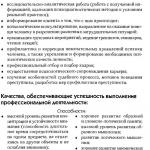How to create an interview sheet for drivers? Instructions: how to fill out an interview sheet with a driver Personal driver interview.
Interview sheets with the driver (a sample can be downloaded below) are drawn up during the professional selection process when conducting a conversation and determining whether the applicant is suitable for the vacant position. The presence of the sheet is provided for by the order of the Ministry of Transport dated 11.03. 2016. N 59, which defines not only the algorithm for professional selection, but also the professional training of future drivers of automobile and electric vehicles.
Why carry out
The selection of future drivers is carried out to attract to work those who have the appropriate level of development of competencies to perform the duties of the position and meet the qualification requirements established by law.
The future employer needs to identify among the applicants those who have sufficient qualifications to successfully perform labor functions.
Why do you need an interview sheet?
The completed driver interview sheet (you can download the form in Word at the end of the article) contains the results of the communication. It will allow the employer to record in writing the fact that applicants meet the requirements established for a specific position. This means that during the conversation the employer will identify the presence of:
- driving license for vehicles of the corresponding category;
- confirmation of the fact of medical examinations;
- compliance of the applicant with certain requirements for the profession and level of qualifications;
- relevant documents that confirm length of service and experience in the required field.
If compliance with the list of available requirements is confirmed, the applicant will be hired by the organization.
The document must be presented upon request of regulatory authorities.
What information to include on the sheet
The interview sheet for drivers (the sample is not established by law) must reflect information about the existing experience and knowledge in the profession. It is one of the documents drawn up by the employer at the stage before concluding an employment agreement, and is developed by the employer independently. For example, interview sheets with a bus driver may contain questions about knowledge of the specifics of legislation regarding the transportation of people by buses (regular and irregular), as well as insurance of the carrier’s liability for damage caused to the life, health, and property of passengers.
Be sure to include:
- date;
- applicant details (full name, position);
- who conducted the conversation (full name and position);
- the candidate's compliance with key requirements;
- Brief conclusion.
Sample
How long to store
Such a document must be kept for at least 5 years. This requirement is set out in Order No. 558 of the Ministry of Culture of the Russian Federation dated August 25, 2010.
Important points
The interview process is carried out orally. However, by the decision of the employer, in addition to the oral conversation, a written conversation (test) can be conducted.
General requirements must be taken into account:
- neat appearance;
- arriving at the meeting without delay, at a strictly scheduled time (if you fail to arrive on time, be sure to notify about the changes);
- have with you a complete list of required documents;
- references from a previous workplace, if available.
During the conversation, the future employee will need to present his knowledge to the potential employer in such areas as:
- Traffic Laws;
- control in the “driver-vehicle-road” and “driver-vehicle” systems;
- monitoring the situation on the road, monitoring traffic safety, the influence of weather and road conditions on it;
- pedestrian safety;
- safety of child passengers;
- consequences of traffic violations;
- first aid;
- operation of the main mechanisms of the machine;
- breakdowns on the road.
In addition to presenting knowledge and experience, the interview may also touch on personal issues:
- about health;
- about attitude towards bad habits.
The absence of the latter will have a positive effect on the image of the applicant.
Many established principles of interviewing have lost their relevance. For example, it is now almost impossible to catch candidates off guard with unexpected questions. Sites like Glassdoor allow them to determine what questions employers are asking most often and what answers they expect. With this information, applicants systematically prepare for interviews, memorizing answers until they begin to make the right impression, sound sincere and authentic.
It's not just unexpected questions that are a thing of the past. Research at companies like Google shows that puzzle questions often lead to costly hiring mistakes, that the number of interviews does not improve the quality of hires, and that in some professional fields, applicants' educational background, grades, and test scores are inconsistent. allow you to accurately predict success.
Therefore, it is time to reconsider the process of selecting interview questions, focusing on those that are relevant to professional work, but at the same time cause difficulties in preparation.
Avoid questions whose answers can be rehearsed
If you work for a large corporation, all your questions have long been published on Glassdoor (along with recommended answers), so you will have to start with a clean slate - at a minimum, get rid of the questions that are heard in every interview, provoke banal answers and have low predictive value , such as “Name your biggest weakness,” “Why should we hire you,” “Describe your dream job,” and “Where do you see yourself in five years?”
Don't get carried away with behavioral issues
In today's world, the value of questions that force candidates to describe their past (also known as "behavioral questions" - for example, "Tell me about a time you...") is questionable because the techniques used in the job become outdated very quickly. According to a study by professors Frank Schmidt and John Hunter, the predictive value of such questions is only 12% higher than that of a coin toss. Why? Because what allowed a candidate to succeed a few years ago may not be applicable where he plans to work today. In addition, good storytellers can make it seem like they solved the problem themselves, even though in reality they had little role to play.
Assess problem solving ability
If you were hiring a chef, you would probably ask him to cook something. If you want to identify the best candidates, talk to them about the specifics of the job and offer to perform specific tasks. Ask:
- Identify possible problem areas. You might say something like, “Tell me in detail about the actions you will take in your first few weeks on the job to gain a full understanding of the challenges and opportunities.”
- Solve an existing problem. The ability to solve problems largely determines professional success. Describe to the candidate a realistic problem they might face on their first day of work. Ask him to describe the actions he could take to solve the problem. Before the interview, create your own algorithm. Include such important points as collecting information, discussing the problem with colleagues or the customer, and defining criteria for success. Ensure that the candidate does not skip these steps.
- Identify weaknesses in the procedures used. Provide the candidate with a description of an existing imperfect procedure that is directly related to his job. Ask to analyze it and identify serious problems that such imperfections can lead to. Before your interview, be sure to create your own list.
Evaluate Foresight
Professionals working in dynamic industries must be able to predict the future. Examples of questions to find such people:
- Describe your work plan. Before taking on a new job or project, the best employees always make plans. Ask to outline the key points of the plan for the first 3-6 months, including goals, aspirations to align with stakeholders, data analysis, communication with colleagues, criteria for measuring success, etc.
- Try to predict the dynamics of development of a position or industry as a whole. The ability to anticipate major changes is very important. Ask to describe at least five possible options for how the role will evolve over the next three years and how those changes will impact the business as a whole. New employees also need to be prepared for changes in the industry itself. Ask them to name 3-5 big trends and describe the changes that need to be implemented to meet them.
Assess ability to learn, adapt and innovate
If the employee may need all of this, ask the following questions:
- Training: “Describe how you gain new knowledge and maintain your professional level on an ongoing basis.”
- Flexibility: “Describe how you adapt to significant but unexpected changes related to technology or customer expectations.”
- Innovation: “Describe the steps you would take to innovate to take advantage of new technologies and compete.”
Don't repeat yourself
When interviewing a candidate, do not ask about things that can be read on a resume (for example, where they studied or what duties they performed at their previous job).
Make time for sales
Of course, most of your interview effort should be focused on assessing the candidate, but don't forget that you also need to captivate them by selling the position and the company itself. Take the initiative and ask: “What criteria do you use to evaluate employer proposals?” After that, provide strong arguments for each point.
In some cases, interview results may not be easy to interpret. Some companies (for example, the Indian online store Flipkart) successfully hire candidates without interviews. However, research shows that the chances of success can be increased by carefully selecting questions and determining acceptable answers. One study also notes that people can make hiring decisions in as little as 15 seconds, so you should consciously avoid making any judgments in the first half of the interview.
hbr.org, translation: Olga Airapetova
A lot depends on the professionalism and personal qualities of a personal driver - the safety of all family members, successful business management, and timely fulfillment of certain business duties.
A family driver is an indispensable assistant for a business person. In families with children, he delivers and picks up children from kindergarten, schoolchildren and students from educational institutions or developmental and sports sections, and a personal driver delivers working parents to work and business meetings in a timely manner. Not only the successful running of your business, but also the safety of your children and the timely fulfillment of certain household responsibilities often depend on his professionalism and personal qualities.
How to recognize a person who is ideal for this responsible position?
Personal qualities of a personal driver
The main, at first glance, characteristics (extensive driving experience, diligence, decency, lack of criminal record, etc.) indicated by the applicant in the resume are far from an absolute guarantee that this candidate will satisfy all your requirements. Therefore, in order to better learn about the personal qualities of a potential personal driver, we recommend asking a number of questions below during the interview.
What is your attitude towards alcohol? Obviously, the position of a personal driver is definitely not suitable for those who like to drink alcoholic beverages. Less obvious is the fact that a person who is “coded” from alcohol for personal reasons is also not the best candidate for a given vacancy. As a rule, such people are characterized by constant internal tension, which can intensify in a stressful situation on the road and provoke extremely undesirable consequences.
Where did you work before you submitted your resume for a driver position? There is a category of applicants who, having not realized themselves in any profession (builder, doctor, businessman, etc.), turn to the field of service personnel and choose the position of driver. If in a conversation you can clearly hear regret about past professional activities, if you feel that the applicant is considering working as a personal driver as a way to “wait out” difficult times, you should be wary. Firstly, it is possible that such a candidate simply does not have enough professional knowledge and experience to work effectively. And secondly, watching your business successes every day, an applicant whose career has not worked out may experience a feeling of envy that is not conducive to normal cooperation and a comfortable microclimate.
 Have you ever had conflict situations with strangers in the past? This question is also very important. If you understand that in front of you is a rather harsh, unfriendly and even conflict-ridden person, it is likely that having “secured” himself with your high position in society, he will be able to feel permissiveness and impunity, while creating emergency situations on the road (exceeding the speed limit, driving at red light, etc.).
Have you ever had conflict situations with strangers in the past? This question is also very important. If you understand that in front of you is a rather harsh, unfriendly and even conflict-ridden person, it is likely that having “secured” himself with your high position in society, he will be able to feel permissiveness and impunity, while creating emergency situations on the road (exceeding the speed limit, driving at red light, etc.).
What to pay attention to during an interview?
First of all, when interviewing candidates, pay attention to their behavior. The applicant should be quiet, modest, polite, but not overly timid. You should be wary if a potential personal driver behaves too politely and tries in every possible way to please with his actions and answers to your questions. This behavior may indicate two things: that this person is trying to ingratiate himself, as a successful and influential person, into your trust in the name of obtaining further personal gain, or that he is excessively proactive, which can harm your business. Any familiar relations between an employee and an employer can provoke various conflict situations not only with you, but also with family members, clients and business partners. In addition, in the event of a personal grievance, such an employee, out of a sense of revenge, may violate professional ethics by disclosing your personal information. And any rumors and gossip can threaten a serious blow to your reputation.
 Professional approach to selecting a personal driver
Professional approach to selecting a personal driver
If you need a decent, punctual and responsible employee who will unquestioningly carry out your instructions and keep family secrets secret, contact us! The personnel base of the recruitment agency “Friendly Family” is constantly expanding and today includes more than a hundred professionals who were carefully selected by our specialists. In addition to our personal drivers having extensive driving experience, confirmed by relevant documentation and practical testing, we guarantee that each candidate presented to you has the necessary set of personal qualities required for such a responsible position. All our applicants have passed multiple stages of testing by psychologists and driving instructors; We carefully studied their individual social media profiles and checked employer reviews from previous jobs. Therefore, turning to






